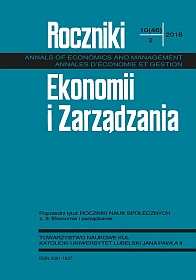The Shadow Economy and Public Revenues
Abstract
Conducting business activity or simply living in a given area entails incurring burdens in the form of various types of public levies for the benefit of the state, a local government unit or another public-law association. However, not all those who are obliged to do so always properly perform their duties, as they operate in the shadow economy. The thesis of the study is that among public entities the most loss (in the form of revenue loss) due to the existence of the shadow economy market is felt by territorial self-government units, including municipalities, which therefore may have at their disposal a smaller financial envelope for the implementation of tasks imposed on them. The aim of the study, which is to identify the problems related to 1) estimating the size of the shadow economy in Poland and public income losses due to its existence, 2) determining the extent to which public entities lose income as a result of the shadow economy and determining the order of their size, 3) the existence of the shadow economy in the context of the teaching of the Catholic Church, and 4) the types of necessary actions to be taken to limit the loss of public income related to the shadow economy. The objectives were subordinated to the layout of the study, in which particular attention was paid to the loss of territorial self-government units’ income due to the existence of the shadow economy.
References
Katechizm Kościoła Katolickiego, Pallottinum, Poznań 1994.
Komunikat CASE poświęcony raportowi przygotowanemu na zlecenie Komisji Europejskiej.
Kotlińska J., Peek B., Luka podatkowa w podatku od towarów i usług w Polsce, „Roczniki Ekonomii i Zarządzania” 9(45)(2017), nr 4.
Leon XIII, Encyklika „Rerum novarum”, Watykan 1891.
Mróz B., Gospodarka nieoficjalna w systemie ekonomicznym, „Monografie i Opracowania SGH” 2002, nr 509.
Odpowiedź podsekretarza Stanu z Ministerstwa Finansów, p. Pawła Cybulskiego z dnia 5 kwietnia 2018 roku, na interpelacją Posłów na Sejm RP – Wojciecha Króla oraz Pawła Bańkowskiego z dnia 16 marca br. (nr 20632) w sprawie tzw. karuzeli podatkowej, przesłana na ręce Marszałka Sejmu RP Marka Kuchcińskiego.
Pismo Święte Nowego i Starego Testamentu. Biblia Tysiąclecia, Pallottinum, Poznań 2003.
Postanowienie Sądu Najwyższego z 3 października 2008 r. (Sygn. akt III KK 176/08).
Rachunki kwartalne Produktu Krajowego Brutto. Zasady metodologiczne, Główny Urząd Statystyczny, Warszawa 2012.
Rachunki narodowe GUS według sektorów i podsektorów instytucjonalnych w latach 2011-2014, Główny Urząd Statystyczny, Warszawa 2016.
Raczkowski K., Gospodarka nieoficjalna w systemie zarządzania państwem, „Przedsiębiorczość i Zarządzanie” 14(2013), z. 8, cz. II.
Schneider F., Buehn A., Estimating the Size of the Shadow Economy. Methods, Problems and Open Questions, “CESifo Working Paper” 2013, No. 4448.
Smith B., Assessing the Size of the Underground Economy: The Statistics Canada Perspective, Income and Expenditure Accounts Technical Series 1994.
Copyright (c) 2018 Roczniki Ekonomii i Zarządzania

This work is licensed under a Creative Commons Attribution-NonCommercial-NoDerivatives 4.0 International License.


